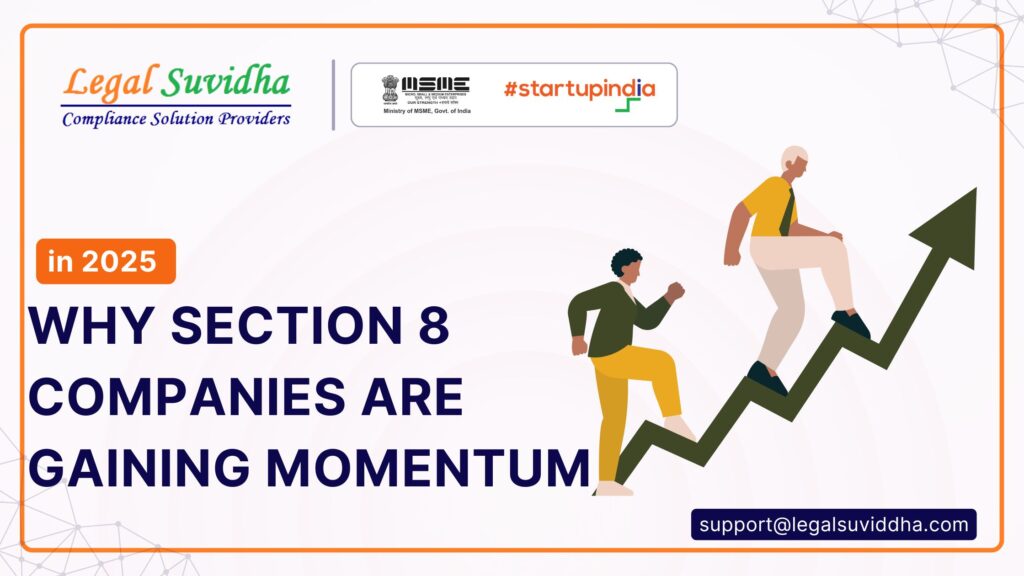Why Section 8 Companies Are Gaining Momentum in 2025
What happened to Meera that changed everything?
It was 3:00 p.m. when Meera got the call, she had been waiting months for.
A reputed FMCG company was finally responding to her CSR proposal. She sat up straighter, fingers crossed.
Then came the words that crushed her:
We can’t proceed unless you’re registered as a Section 8 company.
And just like that, her two years of grassroots work—feeding 300+ children daily—wasn’t enough.
Why doing good work isn’t enough anymore
Meera isn’t alone. In 2025, countless founders, volunteers, and dreamers are building schools, clinics, food drives, or women-led collectives—yet remain legally invisible.
They rely on trusts or societies, unaware of how limited those options are.
Without the right structure, they’re missing out on:
CSR funding
Government grants
International donor interest
Credibility in financial audits
That’s the bitter truth. Doing good isn’t enough anymore.
That’s why Section 8 companies are gaining momentum in 2025.
How the system quietly filters out passionate people
Even with clear impact, many social ventures get rejected.
Why?
Because CSR teams have policies. Government tenders have eligibility. Global NGOs demand FCRA. And most of these require one thing:
A registered Section 8 Company under the Companies Act, 2013.
Trusts and societies don’t offer transparent governance.
They don’t inspire long-term confidence.
They’re often disqualified on paper.
This isn’t about bureaucracy. It’s about legitimacy.
And that’s why Section 8 companies are gaining momentum in 2025.
The smart legal move everyone’s making in 2025
Section 8 companies are nonprofit entities with the structure of a private limited company—but with the soul of a mission.
They offer:
Eligibility for CSR donations (almost all corporates prefer them)
Tax exemptions under 12A and 80G
FCRA registration for foreign donations
Trust & transparency via board-based governance
Startup India recognition for social enterprises
No minimum capital required to start
This clarity is exactly why Section 8 companies are gaining momentum in 2025. They’re trusted, respected, and compliant by design.
For someone like Meera, it’s not just paperwork—it’s a passport to scale.
What makes Section 8 companies future-ready?
Beyond just funding, Section 8 companies open long-term possibilities.
Social ventures with Section 8 status are now:
Winning government partnerships
Attracting angel and impact investors
Joining startup incubators
Participating in UN, WHO, and EU-funded programs
They’re building not just credibility, but legacy.
And that’s the ultimate reason why Section 8 companies are gaining momentum in 2025—they align legal structure with long-term mission.
If you want your work to outlive trends, donors, and campaigns, this is your answer.
What you can do today—and what happens if you don’t
If you’ve made it this far, one thing is clear: you’re serious about your mission.
And now you understand why Section 8 companies are gaining momentum in 2025.
But timing matters.
CSR approvals for FY 2025–26 are closing soon.
If you’re not registered this quarter, you’re out of the loop for a year.
Option 1: Do Nothing. Stay Invisible.
You’ll keep making impact
But without legal power, your funding options remain limited
You’ll stay stuck explaining why donors should still trust you
Option 2: Act Now. Register with Legal Suvidha.
At Legal Suvidha, we help changemakers like you get:
Section 8 Company Registration
12A, 80G, and FCRA approval
Compliances done—so you can focus on the mission
A fundable, compliant, respected identity
Because missing this chance could cost you 12 months of funding, growth, and recognition.
Connect with our Domain Expert or reach out via WhatsApp for instant help.
📱 Phone: 8130645164
📧 Email: [email protected]
🌐 Website: www.legalsuvidha.com
How to Legally Onboard Foreign Talent in Indian Startups
Due Diligence Ready: Legal, Financial & Tax Docs You’ll Need
Co-Founder Agreement Essentials: Must-Have Clauses & Templates










